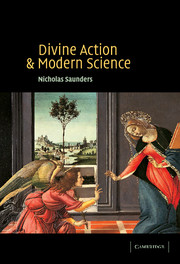Book contents
- Frontmatter
- Contents
- Preface
- Chapter 1 Motivations
- Chapter 2 Theological approaches to divine action
- Chapter 3 The laws of nature and miracles
- Chapter 4 Determinism and SDA
- Chapter 5 Divine action and quantum theory
- Chapter 6 Does God cheat at dice?
- Chapter 7 Chaos Theory and divine action
- Chapter 8 Whole–part models of SDA
- Chapter 9 Is SDA really tenable?
- References
- Index
Chapter 8 - Whole–part models of SDA
Published online by Cambridge University Press: 02 December 2009
- Frontmatter
- Contents
- Preface
- Chapter 1 Motivations
- Chapter 2 Theological approaches to divine action
- Chapter 3 The laws of nature and miracles
- Chapter 4 Determinism and SDA
- Chapter 5 Divine action and quantum theory
- Chapter 6 Does God cheat at dice?
- Chapter 7 Chaos Theory and divine action
- Chapter 8 Whole–part models of SDA
- Chapter 9 Is SDA really tenable?
- References
- Index
Summary
In previous chapters we have considered two principle facets of the current academic debate concerning SDA in nature: what we mean by a ‘miracle’; and how quantum mechanics and chaos theory are claimed to support SDA. It is now time to consider a third limb to the debate, namely the claims made for SDA which arise from a methodology which is variously described as whole–part, top-down, or downwardly emergent. We have already seen a hint at this further approach in John Polkinghorne's concept of downward emergence as applied to the seemingly deterministic equations of chaos theory and classical mechanics. The question we must now address is whether there is another basis on which the world may be said to embody William James' notion of open possibilities. The basis of Polkinghorne's proposal is that at increasing levels of complexity in nature the essentially indeterministic fundamental processes of the world can be codified into pseudo-deterministic equations. The equations thus appear to us to be deterministic, whilst the underlying reality is not. A similar, multi-layered, emphasis on emergent reality lies at the core of Arthur Peacocke's enormous contribution to the debate on SDA. We shall now turn to consider his position in detail.
Arthur Peacocke has had a long and distinguished career both as a scientist and as a priest-scientist and has deservedly recently been awarded the Templeton Prize for Progress in Religion.
- Type
- Chapter
- Information
- Divine Action and Modern Science , pp. 207 - 213Publisher: Cambridge University PressPrint publication year: 2002

